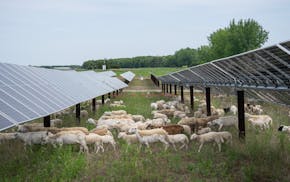WASHINGTON — When Marty Morud opened his solar installation business 15 years ago in Minnesota, his customer base included early adopters and climate-conscious believers.
Now, Morud's company, TruNorth Solar out of Arden Hills, puts solar panels on barns and schools.
This evolution in the industry, he said, came with a change in how Americans view green energy. And the federal government was in lock-step, with tax credits boosting the shift.
Now, however, Congress is on the cusp of passing a budget bill that effectively vaporizes green energy tax credits, including those used to finance solar panel manufacturers to wind farms and geothermal home-heating systems.
Morud, TruNorth's CEO, said the change in course makes his head spin.
"A vast majority of our customers are now middle-income, even low-income," he said. "That's because [the government] figured out they could pay everyone's electric bill for the next 30 years or invest in a cheaper version of energy."
Across Minnesota, a nascent solar industry — sprung from the ashes of the Great Recession with millennial optimism — is reconciling with the emergence of the budget bill, which companies say will crush the industry.
The credits provided both sustainability and job creation, Morud and other supporters said.
But for those who agree with President Donald Trump, who has called the Inflation Reduction Act (IRA) supporting clean energy credits a "Green New Scam," the time has come for an industry to stand on its own legs without the need for tax breaks to be competitive.
Griffin Dooling, CEO of Minnetonka-based Blue Horizon Energy, which like TruNorth started in 2009, sells to customers who use tax credits to finance clean energy systems. Dooling held dozens of meetings in Washington, D.C., over the past several months trying to veer Congress away from obliterating the green-energy incentives.
Under the IRA, various credits were consolidated into a single tech-neutral credit, an attempted overture to Republicans in Congress.
"Unfortunately, it doesn't seem like that generated the support that we had expected," Dooling said, "At least not so far in this legislative process."
Under the bill, tax credits for home and commercial-grade solar projects would sunset or soon be eliminated. Products from China and other countries of concern would be banned. And it would be harder to sell tax credits, a financial incentive for investors.
"It's really just the kill-shot for the industry," said Logan O'Grady, executive director of MnSEIA, a solar energy association. "We've already seen customers saying we can't move forward with the projects with such a radical swing."
Some moderate Republicans have vowed to fight the measure in the U.S. Senate. However, green industry advocates said they will be competing for attention with those who are fighting cuts to Medicaid and food stamps.
Those advocates now feel resigned to the worst-case scenario, which could lead to a collapse of the solar energy industry.
Roughly 5,000 people across Minnesota are employed in the solar industry. The state is not a solar leader, ranking 19th in the U.S. for installed capacity. But the state's rural landscape and embrace of clean energy has attracted marquee investments.
One company, Heliene, got a shout-out from Gov. Tim Walz on the vice presidential debate stage last fall. Based in Sault Ste. Marie, Ontario, Heliene employs hundreds of workers manufacturing solar modules in Mountain Iron, once known mostly for mining ore. Heliene is also cutting the ribbon on a plant in Rogers that could employ 150 people.
Heliene has been talking about a third expansion in the state. But CEO Martin Pochtaruk said his company is ready to pull the plug on further investments in the state if the bill removes a green energy tax credit for advanced manufacturers.
Industry experts note many credits — some traced back to the Carter, Bush and Obama administrations — already were scheduled to end in 2032.
This distinction does little to reassure investors.
"Whether you're calling it a 'cut' or a 'phase-out,' ... the bottom line is the initial proposal from the House is much more a sledgehammer than a scalpel," said Scott Elias, a director with CleanCapital, a New York-based green energy firm that has over a half-dozen projects in rural Minnesota.
Green energy tax credits have drawn their fair share of enemies. In southeastern Minnesota, for example, rural neighbors battle with ever-increasing wind turbines and solar farms on rich farmland around suburban Rochester.
Wendy Jensen, who lives outside Eyota, said a proposed solar farm from a Chicago-based company would surround her on three sides. She's handing out signs to neighbors to stop the project.
"I don't think any of us are opposed to solar," said Jensen. "But it should not be destroying our farmland."
Rural electric cooperatives also balance pursuing green energy opportunities with local sentiment and larger costs.
Justin Jahnz, CEO of Pine City-based East Central Energy, said his cooperative built solar arrays in Cambridge and near Hinckley, partnering with the Mille Lacs Band of Ojibwe. But he sees limits to future smaller projects.
"Small-scale systems don't pencil out without significant federal investments," Jahnz said. "These systems don't stand up on their own."
Which is why many who have worked to support the nascent renewable energy industry in Minnesota see the federal government's role as crucial.
Gregg Mast, with Clean Energy Economy MN, said that many Republicans got elected on a message of driving down costs for families and boosting small businesses.
"We had a decade of certainty," said Mast, who notes over 60,000 Minnesotans work in clean energy. "Now it's a political whipsaw we're seeing and experiencing."
Mast said these manufacturers never imagined they would be abandoned.
"There is complete uncertainty again," Mast said.
On her farm outside Cannon Falls, Cynthia Bennett, who joked she's a veteran in the renewables industry after roughly a decade working for different firms, said the timing couldn't be worse as Minnesota works toward carbon-free electricity by 2040.
On a more personal level, she also lost her job directing grants for a solar company. The company, she said, was concerned about changes to the Inflation Reduction Act initiatives.
"The volatility makes my head spin," Bennett said. "It's a huge hit to everything that we were trying to accomplish."

Xcel lets loose a small army of hungry sheep to keep its solar farm in order
![Frozen Jennie-O turkeys photographed at a Cub Foods store in St. Paul, Minn., on Monday, November 15, 2021. ] Elizabeth Flores • liz.flores@startri](https://arc.stimg.co/startribunemedia/U74OMTK3OMVA7SBJ2BTZ5SF4D4.jpg?h=91&w=145&fit=crop&bg=999&crop=faces)
Hormel's Jennie-O turkey sales surge as competitors contract

Consumers want deals, which leaves Best Buy again predicting little to no growth

To reset downtown Minneapolis skyway life, building owners cut deals with retailers
